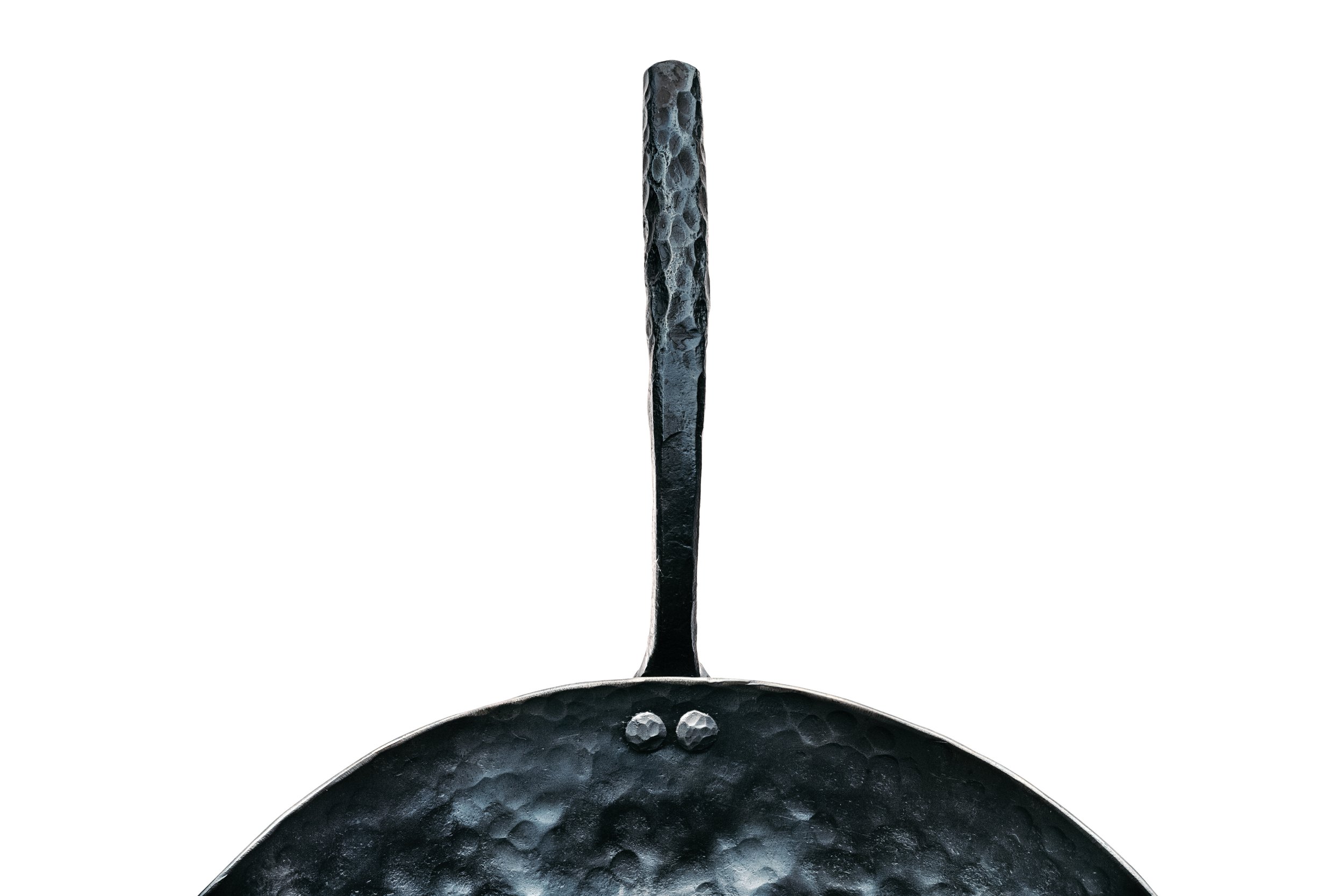
Caring for Your Carbon Steel Cookware
Season Your Pan
To season your cookware, you will need paper towels or dish towels and a high-smoke-point oil of your choice. Some examples of high smoke point oils are coconut, grape seed, or avocado oil.
There are two preferred ways to season your carbon steel: the oven method, which takes about an hour, or the stovetop method, which is a quick and easy way to get that non-stick layer.
Stovetop Seasoning Instructions
Wash your pan
This is a great time to wash and scrub off any build-up from cooking. Avoid anything really abrasive like a steel scrubber, but the back of a sponge is fine. It’s okay to use a little soap at this stage, but we do not recommend using soap with daily use. After washing, dry your pan with a dish towel.
Put your pan on the stovetop
Turn your burner to medium-high and place your dry pan on it. Let it heat until you start to see some browning on the surface. Move your pan around to spread the browning evenly. NOTE: You want the pan to start smoking; you’ll see the bottom of the pan changing to darker hues.
Apply the oil
Once the pan starts to brown, use a paper towel or dish towel with some oil to coat the entire pan in a thin, even layer.
Smoke point
The oil will begin to smoke—this is what we want, as it bonds to the steel. Turn down the heat slightly to avoid excessive smoking. Make sure your kitchen is ventilated. Let the pan continue smoking and allow the oil to burn into the surface.
Cooling time
Take your pan off the hot burner and then let it sit to cool on the stove top. Try to avoid taking your hot pan and running it under water, as it could warp.
Oven Seasoning Instructions
Pre-heat oven
Set your oven to 500–550°F.
Wash your pan
Scrub off any build-up, avoiding abrasive scrubbers. A little soap is okay here but not for daily use. Dry thoroughly.
Place your pan in the oven
Put your dry pan in the oven without oil. Bake for 45 minutes to an hour (we recommend an hour).
Pull out your pan
After baking, promptly apply a thin layer of high-smoke-point oil to the entire surface, including the handle, to protect the pan from rust.
Let it cool
Stick your cookware on your stovetop or let it cool down in the oven after you have turned your oven off.
After purchasing a new pan, season it after the first 5–10 uses to build a strong seasoning base.
Cook with oil or other healthy fats! Eggs will stick if there is nothing to grease the surface.
Each pan develops its own black/bronze patina. It may look splotchy at first, but it evens out with each seasoning.
Too much oil is bad—it can build up and flake. Always apply a thin, even layer.
Cook with some healthy fats when you first get your pan, this will help build up the seasoning.
Preheating your pan before cooking activates the non-stick surface.
Unless there is a lot of food build-up, gently washing your pan with a dish towel or the soft side of the sponge is preferred to maintain your existing seasoning.
We do not recommend using steel wool to clean your cookware, it is very aggressive on the seasoning and usually will strip the pan down to bare metal.
Additional Tips
The Benefits of Carbon Steel
Carbon steel pans are a lot like cast iron, but they actually outshine cast iron in a few key ways. Made from high-quality iron, these pans are naturally non-stick, durable, and work on any heat source. The difference? Carbon steel doesn’t come with some of the limitations that cast iron often has, making it a bit more versatile in the kitchen.
Lightweight and Easy to Handle
Because of the quality steel we use, we can make pans that are more ergonomic and easier to move around the stove. The first thing you’ll notice when you pick up an Independent Ironware pan is just how light it feels compared to a cast iron skillet. Each pan has a long, hand-riveted handle that stays cool, even if you’re cooking for a while.
The thinner material heats up and cools down quickly, which means your food cooks evenly, browns beautifully, and responds quickly when you adjust the heat.
Pre-Seasoned and Naturally Non-Stick
Every pan comes pre-seasoned with a layer of organic coconut oil. This initial seasoning bonds with the metal, protecting your pan until it reaches your kitchen. A good seasoning isn’t just a nice touch; it’s essential for making a pan that performs well.
With a properly seasoned carbon steel pan, you’ll get:
A natural non-stick surface where food slides right off
A unique black/bronze patina that only gets better with time and use
Why Independent Ironware
Our pans are built to last, designed for everyday cooking, and made to make your life in the kitchen easier. If you want to learn more about the care and craftsmanship behind every pan, visit our About page.
